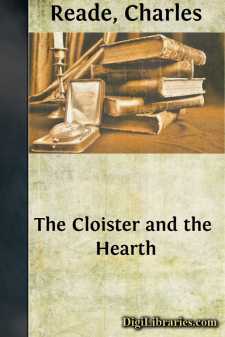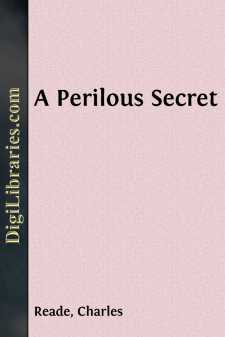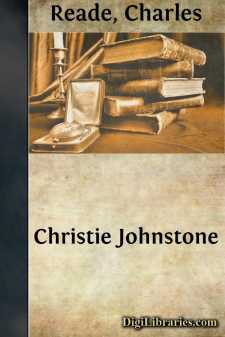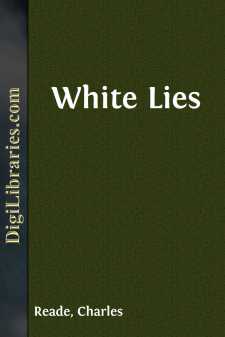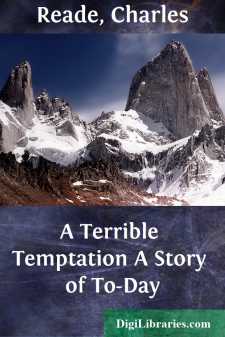Categories
- Antiques & Collectibles 13
- Architecture 36
- Art 48
- Bibles 22
- Biography & Autobiography 813
- Body, Mind & Spirit 142
- Business & Economics 28
- Children's Books 17
- Children's Fiction 14
- Computers 4
- Cooking 94
- Crafts & Hobbies 4
- Drama 346
- Education 46
- Family & Relationships 57
- Fiction 11829
- Games 19
- Gardening 17
- Health & Fitness 34
- History 1377
- House & Home 1
- Humor 147
- Juvenile Fiction 1873
- Juvenile Nonfiction 202
- Language Arts & Disciplines 88
- Law 16
- Literary Collections 686
- Literary Criticism 179
- Mathematics 13
- Medical 41
- Music 40
- Nature 179
- Non-Classifiable 1768
- Performing Arts 7
- Periodicals 1453
- Philosophy 64
- Photography 2
- Poetry 896
- Political Science 203
- Psychology 42
- Reference 154
- Religion 513
- Science 126
- Self-Help 84
- Social Science 81
- Sports & Recreation 34
- Study Aids 3
- Technology & Engineering 59
- Transportation 23
- Travel 463
- True Crime 29
The Cloister and the Hearth
by: Charles Reade
Categories:
Description:
Excerpt
CHAPTER I
Not a day passes over the earth, but men and women of no note do great deeds, speak great words, and suffer noble sorrows. Of these obscure heroes, philosophers, and martyrs, the greater part will never be known till that hour, when many that are great shall be small, and the small great; but of others the world's knowledge may be said to sleep: their lives and characters lie hidden from nations in the annals that record them. The general reader cannot feel them, they are presented so curtly and coldly: they are not like breathing stories appealing to his heart, but little historic hail-stones striking him but to glance off his bosom: nor can he understand them; for epitomes are not narratives, as skeletons are not human figures.
Thus records of prime truths remain a dead letter to plain folk: the writers have left so much to the imagination, and imagination is so rare a gift. Here, then, the writer of fiction may be of use to the public—as an interpreter.
There is a musty chronicle, written in intolerable Latin, and in it a chapter where every sentence holds a fact. Here is told, with harsh brevity, the strange history of a pair, who lived untrumpeted, and died unsung, four hundred years ago; and lie now, as unpitied, in that stern page, as fossils in a rock. Thus, living or dead, Fate is still unjust to them. For if I can but show you what lies below that dry chronicler's words, methinks you will correct the indifference of centuries, and give those two sore-tried souls a place in your heart—for a day.
It was past the middle of the fifteenth century; Louis XI was sovereign of France; Edward IV was wrongful king of England; and Philip "the Good," having by force and cunning dispossessed his cousin Jacqueline, and broken her heart, reigned undisturbed this many years in Holland, where our tale begins.
Elias, and Catherine his wife, lived in the little town of Tergou. He traded, wholesale and retail, in cloth, silk, brown holland, and, above all, in curried leather, a material highly valued by the middling people, because it would stand twenty years' wear, and turn an ordinary knife, no small virtue in a jerkin of that century, in which folk were so liberal of their steel; even at dinner a man would leave his meat awhile, and carve you his neighbour, on a very moderate difference of opinion.
The couple were well to do, and would have been free from all earthly care, but for nine children. When these were coming into the world, one per annum, each was hailed with rejoicings, and the saints were thanked, not expostulated with; and when parents and children were all young together, the latter were looked upon as lovely little playthings invented by Heaven for the amusement, joy, and evening solace of people in business.
But as the olive-branches shot up, and the parents grew older, and saw with their own eyes the fate of large families, misgivings and care mingled with their love. They belonged to a singularly wise and provident people: in Holland reckless parents were as rare as disobedient children....


